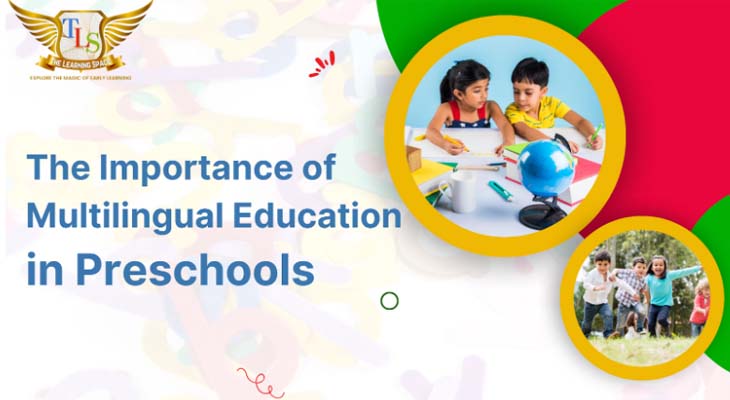The Importance of Multilingual Education in Preschools
- ByStartupStory | January 2, 2025

In today’s time, people who speak in more than one language are in great demand. Multilingual education makes it possible to explore other potential areas of cognitive development in limited spaces such as rapidly growing urban city centers. It not only strengthens the cognitive functions of students and the learning process but also provides better intercultural communication and empathy. Of course, if parents want to find the best instruction for their kids, they must know the multilingual education benefits of the way so they can be well-educated and make the right decision for their children’s development.
What Is Multilingual Education in Preschools?
Multilingual education refers to a child learning two or more languages in the early years. This is achieved in the Preschool in Noida by playing, storytelling, songs, and other activities. Through the use of different languages, the children are involved in such a play which not only makes them more proficient in the language but also enables them to be flexible in the use of language, thus enabling their future in education. Thus, in cities like Noida, where communities come together, integrating multilingual education ensures that children understand and connect with various cultures from an early age.
Benefits of Multilingual Education in Preschools
Enhanced Cognitive Development
According to research, the child who is exposed to more than one language has the highest cognitive abilities as that of the monolingual peer. Multilingual education enhances problem-solving ability, critical thinking, and memorization. For example, a child learning two languages develops the ability to switch between linguistic systems, which strengthens brain flexibility and adaptability.
Better Academic Performance
Learning multiple languages at an early age improves the overall performance of a child in academics. Multilingual children tend to perform better in mathematics, science, and literacy because they have developed improved concentration and analytical skills. Preschools and daycares in Noida, focusing on multilingual education, lay a strong foundation for the success of children in formal schooling.
Cultural Awareness and Empathy
Multilingual education builds an understanding and love of different cultures. Children experience other traditions, cuisines, and lifestyles, which improves the children’s worldview, respect, and celebration for diversity. In a country as multicultural as Noida, this helps children come closer to respecting and honoring diversity, thus building empathy.
Improved Social Skills
Children who are brought up in a multilingual environment develop effective social skills. It becomes easier for them to befriend people in multiple languages, and the child becomes adaptable in various social settings. In this context, being a cosmopolitan area, Noida is also beneficial because the children may get friends belonging to diverse linguistic and cultural backgrounds.
Enhanced Creativity
Multilingual education encourages children to think differently, which promotes creativity. Changing between languages improves mental flexibility, which is associated closely with creative thinking and innovation. Storytelling or bilingual songs in preschool enhance this skill in a lively manner.
Strategies for Implementing Multilingual Education in Preschools
Immersive Learning Environments
Preschools and daycares may create language-rich environments in which children are exposed to several languages through conversation, play, and daily routines. Teachers can alternate between languages for specific activities, thereby balancing the exposure of children to several languages.
Interactive Activities
Storytelling, songs, and games have proven to be very instrumental in teaching languages. Other interactive activities, such as role play or puppet shows in another language, keep the child entertained while learning.
Cultural Integration
Introducing cultural festivals, songs, and regional food along with language lessons will help kids connect with the cultural aspects of each language. This aids in language learning and enriches cultural appreciation.
Trained Educators
Preschool needs experienced teachers who can efficiently incorporate multiple languages into all interactions. Teachers should master the target languages and should be able to use some creative methods to engage these young learners.
Use of Technology
Interactive apps, videos, and digital stories could supplement multilingual education. This would make language learning engaging and accessible even when working at home, aiding the preschools and the parents.
Why Daycares in Noida Should Embrace Multilingual Education
Daycares in Noida have the unique opportunity to shape young minds during their most formative years. By incorporating multilingual education, they can provide children with a competitive edge while nurturing cognitive, social, and emotional growth. Parents seeking daycare services in Noida should focus on institutions that value multilingualism and incorporate it into their curriculum.
Conclusion
The importance of multilingual education in preschools cannot be overstated. In places like Noida, where diversity thrives, teaching children multiple languages is equipping them with the required skills to navigate an increasingly interconnected world. From the enhanced cognitive abilities and cultural awareness to better social skills and career prospects, the importance of multilingual education cannot be overstated.
This approach adopted by preschools and daycare in Noida provides a solid basis for lifelong learning, creativity, and global citizenship. Parents, while choosing the institution, will be bestowing their children with the gift of a head start on embracing a multilingual and multicultural future.









